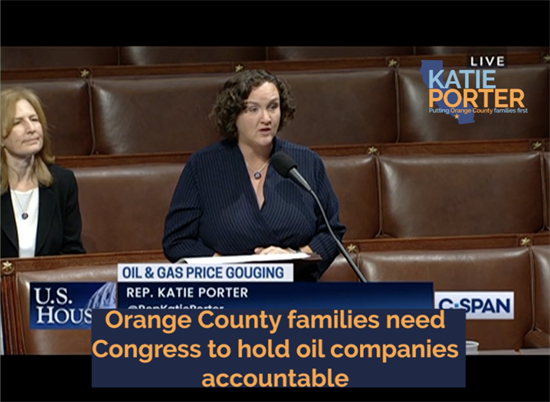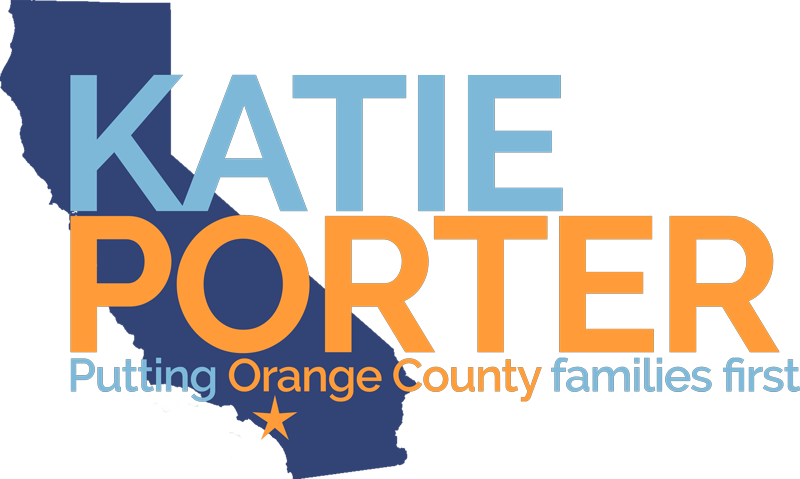Press Releases
House Passes Rep. Katie Porter’s Legislation to Lower Gas PricesCongresswoman’s bill would hold Big Oil accountable for price gouging families at the pump
Washington,
May 19, 2022
WASHINGTON—The House of Representatives today passed Congresswoman Katie Porter (D-CA)’s legislation to crack down on Big Oil’s predatory price increases at the pump. The Consumer Fuel Price Gouging Prevention Act, co-led by Congresswoman Kim Schrier (D-WA), would lower gas prices by making exploitative price hikes unlawful, holding market manipulators accountable, and boosting transparency in the oil and gas market. “I’m a proud capitalist, and what we’re experiencing with fuel prices is the result of a broken market,” said Rep. Porter, Chair of the House Natural Resources Subcommittee on Oversight. “Big Oil executives are bragging to shareholders about price gouging families at the pump. They’re purposely keeping supply low to earn record-high profits, squeezing families—and our entire economy—in the process. I’m glad my House colleagues share my commitment to holding the industry accountable and lowering costs for families.” Fossil fuel executives have admitted to deliberately keeping supply artificially low to juice profits. The industry currently sits on more than 9,000 approved but unused drilling permits on 13.9 million acres of U.S. public lands. Big Oil continues to raise prices at the pump despite unused permits and sky-high profits. Shell, one of the largest oil companies in the world, recently announced a record-breaking $9.1 billion in quarterly profit—an amount nearly triple the $3.2 billion earned a year earlier. Exxon Mobil and Chevron have recently pledged to use their high revenues to enrich shareholders, announcing $30 billion and $10 billion in stock buybacks, respectively, by the end of the year. “At a time when people in my district and across the country are feeling the pain of high prices at the gas pump, Congress needs to be doing all we can to bring down costs,” said Rep. Schrier. “Gas prices in my neighborhood were already high at $5/ gallon two weeks ago. Now, for no apparent reason, prices are up another 10% in the last week, at $5.50/ gallon. Meanwhile, neither the price of a barrel of oil nor the cost of refining have changed appreciably. The Federal Trade Commission (FTC) needs to have the power to investigate and crack down when there is evidence of real gouging.”  Watch Congresswoman Porter debate the Consumer Fuel Price Gouging Prevention Act HERE. A high-resolution video is available for download HERE. The Consumer Fuel Price Gouging Prevention Act, which would be the first-ever federal law against price gouging, would:
Porter’s legislation would also hold market manipulators accountable and boost transparency in the industry by:
The Consumer Fuel Price Gouging Prevention Act is supported by a coalition of environmental groups including Accountable.US, Earthjustice, League of Conservation Voters, Natural Resources Defense Council, and Sierra Club. “This year is shaping up to be even better than the last for the oil and gas industry. Unfortunately for consumers, good news for Big Oil’s bottom line never seems to be good news for them,” said Jordan Schreiber, director of energy and environment at Accountable.US. “Oil and gas giants like Halliburton admit it’s in their best interest to create a perpetual threat of undersupply to keep consumer prices high and their insane profits rolling in. It is time for Congress to hold the oil and gas industry accountable for its reckless price gouging and profiteering.” Congresswoman Porter has consistently fought to hold Big Oil accountable for exploiting families and taxpayers. In March, she helped spearhead legislation, the Big Oil Windfall Profits Tax Act, that would crack down on profiteering at the pump and use the revenue to provide relief to families. She’s introduced a bill, the Ending Taxpayer Welfare for Oil and Gas Companies Act, to raise fees on polluters extracting from public lands. Porter has also confronted Big Oil executives, including the CEOs of BP, Exxon Mobil, Shell, and Chevron, directly about the industry’s predatory behavior. ### |
